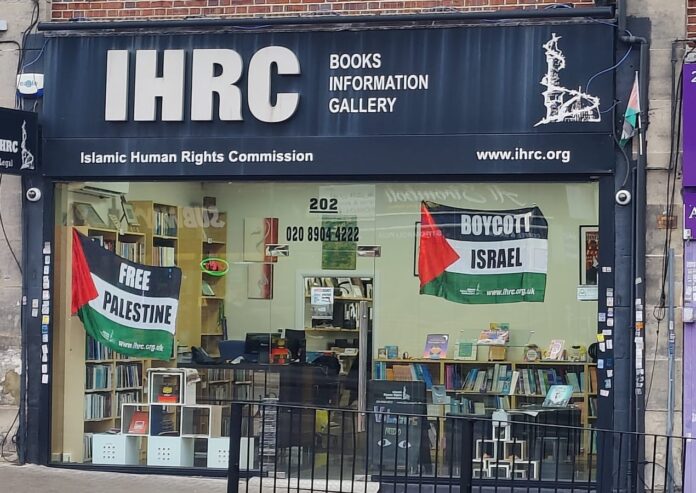The Islamic Human Rights Commission (IHRC) is demanding an apology from Labour MP Barry Gardiner after he asked them to remove a Palestine flag with ‘Boycott Israel’ written on it from their shop window in Wembley, north London.
Gardiner, the MP for Brent North, visited the headquarters of IHRC during Ramadan, and asked if the organisation would remove a flag on the grounds that it had caused offence to a constituent.
Mr Gardiner said the constituent felt the flags were causing tension in the area because they had the words ‘Boycott Israel written on them and the IHRC is situated next to a Kosher bakery.
The IHRC declined the request and continues to display the flags in its shop window. However, they have written to Mr Gardiner asking him to apologise for “this blatant attempt to stifle our freedom of expression.”
“This is a brazen attempt to bully people into silence over their support of Palestinian rights, a tactic which is increasingly being employed by the pro-Israel lobby,” the IHRC said. “Over the last couple of years neighbouring shops have removed Palestine flags after being arrested by police and being threatened by constituents.”
Mr Gardiner has refused to apologise and is disputing the IHRC’s version of events. He copied 5Pillars into a letter that he had sent to the IHRC which says that he felt compelled to follow up the complaint because the IHRC is situated right next to a Kosher bakery and therefore the flags were likely to cause offence.
He added that he stands by his belief that it is not wise to display the Palestinian flag with the invitation to Boycott Israel next to a Jewish Kosher bakery.
Subscribe to our newsletter and stay updated on the latest news and updates from around the Muslim world!
The IHRC letter, from chairman Massoud Shadjareh, said: “I must say that all of us at IHRC and indeed in the wider community are shocked at this turn of events. As a result, we feel we are owed an apology from you for your comments and actions in this matter.
“These flags are sold at the shop, and are campaign resources for those working in support of Palestinian liberation and to end Israeli apartheid. You stated that you knew that there was nothing wrong or illegal with these flags, one of which has the words ‘Free Palestine’ written on it, and one of which has the words, ‘Boycott Israel’. You claimed that you had received a letter from a community member stating that the flags were causing tension, and upon further conversation with a volunteer from the shop you stated that you assumed it was the flag with the words ‘Boycott Israel’ that were the cause of this.
“As you are aware, the text on the flags, ‘Boycott Israel’ follows the example of the South African struggle against apartheid. You acknowledged there was nothing wrong with this phrasing. Why then did you choose to come to the shop and demand we take the flag(s) down?”
The IHRC letter also asks why Gardiner is “making demands for us to give up our basic rights to protest and to support the legitimate demands for justice for the Palestinians?”
“It seems that you feel at ease to ask Muslims and pro-Palestinians to give up their rights for no reason other than someone has contacted you, someone who in your own words, had no reason to feel any offence…” the letter said.
“In the meantime, we will continue to display the Palestinian flags in the shop window. At a time when Israel has banned the flying of the Palestinian flag, and arrested people for doing so, attempts to remove them from visibility in the UK need to be opposed. It is clear that justice for Palestinians, and indeed Muslims and pro-Palestinians, needs defending now more than ever.”
‘Community tensions’
In his response Barry Gardiner told Massoud Shadjareh: “When I called at the shop last Friday evening, I respectfully greeted the lady and the gentleman who were in the front of the shop with ‘As-salam alaykum’ and politely introduced myself as the local Member of Parliament. I immediately stated that I considered you had every right in law to display the two flags, as they did not in my view constitute incitement to racial or religious hatred and were within your legitimate right to free speech.
“I then explained the context, which you have conveniently left out of your account; namely that because they were being displayed next door to a Kosher bakery, they could cause tension and undermine good community relations. I indicated that I had already received correspondence to that effect, and I asked your colleagues to consider whether they believed it might hinder good community relations and whether they might reconsider what action to take in the light of my representations. I did not ‘demand’ or even explicitly ask them to take the flags down.
“Your colleagues were resolute in saying they would not take the flags down and said ‘We do not pander to racists.’ I repeated that I was concerned only to defuse any community tension and whilst I accepted the messages on the flags were within the law and within their rights of free speech I felt that it was a matter in which they might be persuaded to use their judgement to avoid any such tension. They again refused and so I thanked them for their time and left.

“A few seconds after I had left, I was followed down the street by another gentleman from the shop who began video recording me. I do not know who this gentleman was. He called after me and I turned and spoke with him. Upon confirming that I was Barry Gardiner he said ‘The member of Labour Friends of Israel.’ I said that indeed I was, and pointed out that I was also a member of Labour Friends of Palestine. He was highly enervated and demanded that I condemn Israel as an Apartheid State. I said that I would not use his words and preferred to use my own words to speak out against those actions of the Israeli government with which I disagreed. I pointed out that I had done so on numerous occasions – at one point being publicly denounced by the Rabbi in a local synagogue for doing so.
“I explained what I had already said about the flags and the Kosher bakery and as the gentleman had affected ignorance of it being a Jewish bakery, I turned his camera round to show the kosher sign in the bakery window. I then ended the conversation politely and left.”
Gardiner added: “Your letter says that I ‘acknowledged there was nothing wrong’ with the phrasing of the flag that said ‘Boycott Israel’ and later states that I was prompted by a ‘misplaced sense of offence (sic) from a constituent.’ Both of these statements are incorrect. The whole point of the Right to Free Speech is that it gives you the legal right to say something that is offensive. The law only provides that free speech cannot be used to incite hatred or violence. That is why I made clear that I believed you had every right under the law to display the flags with those messages. It does not follow that I thought you were right to do so next to a Kosher bakery, or that the offense you were causing was not real and justified. The law allows us to be offensive; it is not always right to be so…
“You will be aware that I voted in favour of the UK government recognising the State of Palestine alongside the State of Israel. I continue to condemn the illegal Israeli settlements and I have spoken out on many occasions against Israel’s disproportionate use of force.
“That does not mean that I think that an organisation whose stated aim is: ‘to promote human rights and equality and diversity (in particular good race relations) throughout the world for the benefit of the public,’ is either wise or acting in accordance with its own objectives by posting the Palestinian flag with the invitation to Boycott Israel next to a Jewish Kosher bakery.
“In my view such an act was bound to cause offense. However, our freedom of speech is precisely a freedom to offend. I had believed it might be worth speaking to your colleagues in the IHRC shop to urge them to behave in what I considered a reasonable and non-confrontational manner for the sake of harmonious community relations. Sadly they and you appear to be unwilling and have chosen to assert your rights within the law. I guarantee you that I will defend your right to do so, but you cannot expect me to applaud what I believe to be a poor decision. Nor can you expect me to apologise for hoping you might have responded more positively.”



















